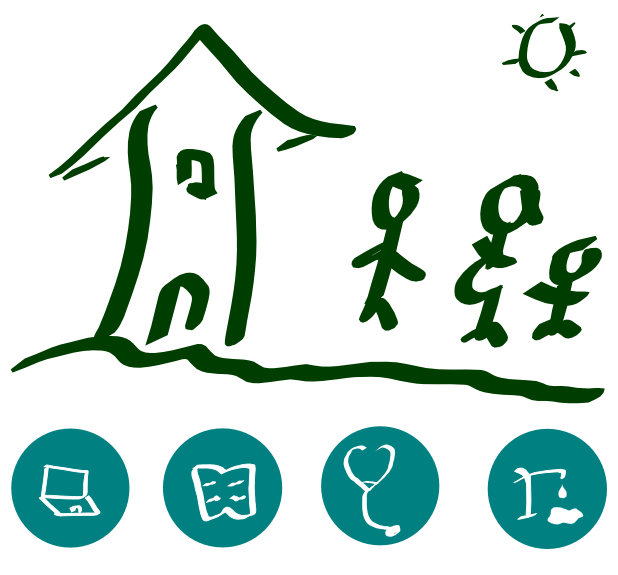GNU Health
 | |
| Original author(s) | Luis Falcón |
|---|---|
| Developer(s) | GNU Solidario |
| Initial release | August 16, 2011 (1.3.0)[1] |
| Stable release |
4.2.3 (September 24, 2023) [±] |
| Preview release | none [±] |
| Written in | Python |
| Operating system | Cross-platform |
| Type | Laboratory informatics software |
| License(s) | GNU General Public License v3.0 |
| Website | health.gnu.org |
GNU Health is a free open-source hospital information system (HIS), notably used by United Nations University - International Institute for Global Health.
Product history
GNU Health actually began in late 2008 as Medical (which was based off of the open-source project OpenERP), a free SourceForge-based software designed to run a medical clinic or small hospital.[2] Development steadily continued on the Medical project, gaining popularity in the public health sector. In April 2011, the development team learned OpenERP was no longer publicly making its scripts available, and a support contract would be needed to make any further upgrades. Development immediately shifted away from the OpenERP platform to the Tryton platform.[3] That same month Thymbra, the entity that held the rights to Medical, transfered the Medical project to non-profit GNU Solidario.[4][5] By the beginning of July, the software had changed names to GNU Health and had been demoed — with the Tryton platform — at the International Institute of Global Health.[6]
On August 16, 2011, the first major release of the new GNU Health application occurred in the form of version 1.3.0.[1] An updated 1.3.3 arrived a month later.[7]
Known release dates of GNU Health (2013 and prior) are as follows:
| Version | Release date |
|---|---|
| 2.0.0 | 08 July 2013[8] |
| 1.8.1 | 18 March 2013[8] |
| 1.8.0 | 10 February 2013[8] |
| 1.6.4 | 25 October 2012[8] |
| 1.6.3 | 28 August 2012[9] |
| 1.6.2 | 18 June 2012[8] |
| 1.6.1 | 30 May 2012[8] |
| 1.6.0 | 28 May 2012[8] |
| 1.4.5 | 20 April 2012[8] |
| 1.4.4 | 11 March 2012[9] |
| 1.4.3 | 30 January 2012[8] |
| 1.4.2 | 01 November 2011[8] |
| 1.4.1 | 30 October 2011[9] |
| 1.4.0 | 27 October 2011[8] |
| 1.3.3 | 19 September 2011[7] |
| 1.3.0 | 16 August 2011[1] |
Awards
In early 2012 the Free Software Foundation awarded GNU Health as 2011's Project of Social Benefit.[10]
Features
Features of GNU Health include[11]:
- based on disease and medical procedure standards (ICD-10 / ICD-10-PCS)
- prescription writing
- billing
- genetic and hereditary risk tracking
- epidemiological, statistical reporting
- 100% paperless patient examination and history taking
- patient administration
- doctor administration
- lab administration
- pharmaceutical knowledge base
- inventory management
- hospital financial administration
- document management
Hardware/software requirements
To effectively install GNU Health, you'll need:
- PostgreSQL
- Python 2.6 or greater
- Tryton 2.4
- Python QRCode library 2.4.1 or greater (only required for the qrcodes module)
- Python PyWebDAV library 0.9.8 or greater (only required for the calendar modules)
For more on installation requirements and instructions, please refer to the technical guide.
Videos, screenshots, and other media
Screenshots of GNU Health can be found here.
An online demo exists, though it requires a Tryton installation. More information here.
Entities using GNU Health
Users of GNU Health include[12]:
Africa Next Door, African Health Network, Dr. Oñativia Regional Center – Argentina, European Commission – JOINUP, Griya Husada Hospital, Griya Waluya Hospital, Marcelo-Padilla Hospital – Phillippines, Masaki International Clinic – Tanzania, Mojowarno Christian Hospital, Peerless Hospital, Portal do Software Público Brasileiro, San Vicente Primary Care Center – Argentina, Sharq Medical Center, The Academic Hospital Paramaribo (AZP) – Suriname, The United Nations University, Victoria Hospital – Zambia
Further reading
External links
- GNU Health code repository
- GNU Health development pages
- GNU Health documentation
- GNU Solidario
- Luis Falcón/Thymbra blog
References
- ↑ 1.0 1.1 1.2 Falcón, Luis (16 August 2011). "GNU Health release 1.3.0 with support for Tryton". Thymbra. http://www.meanmicio.org/2011/08/gnu-health-release-130-with-support-for.html. Retrieved 10 October 2012.
- ↑ Willis, Nathan (12 October 2011). "GNU adopts a healthcare project". Eklektix, Inc.. http://lwn.net/Articles/462600/. Retrieved 10 October 2012.
- ↑ Falcón, Luis (8 September 2011). "Free Software versus Open Source: Tryton vs OpenERP". Thymbra. http://www.meanmicio.org/2011/09/free-software-versus-open-source-tryton.html. Retrieved 10 October 2012.
- ↑ "GNU Health : Services". GNU Solidario. http://health.gnu.org/services.html. Retrieved 10 October 2012.
- ↑ Falcón, Luis (27 September 2011). "Why Thymbra is no longer an OpenERP partner". Thymbra. http://blog.thymbra.com/2011/09/why-thymbra-is-no-longer-openerp.html. Retrieved 10 October 2012.
- ↑ Falcón, Luis (22 July 2011). "[Medical-devel Succes of GNU Health Academia in the United Nations University"]. SourceForge. http://sourceforge.net/mailarchive/forum.php?forum_name=medical-devel&max_rows=25&style=nested&viewmonth=201107&viewday=22. Retrieved 10 October 2012.
- ↑ 7.0 7.1 Falcón, Luis (19 September 2011). "GNU Health 1.3.3 is out!". Free Software Foundation. http://savannah.gnu.org/forum/forum.php?forum_id=6955. Retrieved 10 October 2012.
- ↑ 8.00 8.01 8.02 8.03 8.04 8.05 8.06 8.07 8.08 8.09 8.10 "Home / gnu_health / stable". SourceForge. http://sourceforge.net/projects/medical/files/gnu_health/stable/. Retrieved 10 October 2012.
- ↑ 9.0 9.1 9.2 "Latest News Approved - With Summaries". Free Software Foundation. http://savannah.gnu.org/news/?group_id=10844. Retrieved 10 October 2012.
- ↑ Lee, Matt (26 March 2012). "2011 Free Software Awards announced". Free Software Foundation. Archived from the original on 28 March 2012. http://www.webcitation.org/66W0cOAnx. Retrieved 28 March 2012.
- ↑ "GNU Health : Main Features". GNU Solidario. http://health.gnu.org/main-features.html. Retrieved 10 October 2012.
- ↑ "GNU Health : Community". GNU Solidario. http://health.gnu.org/community.html. Retrieved 10 October 2012.









